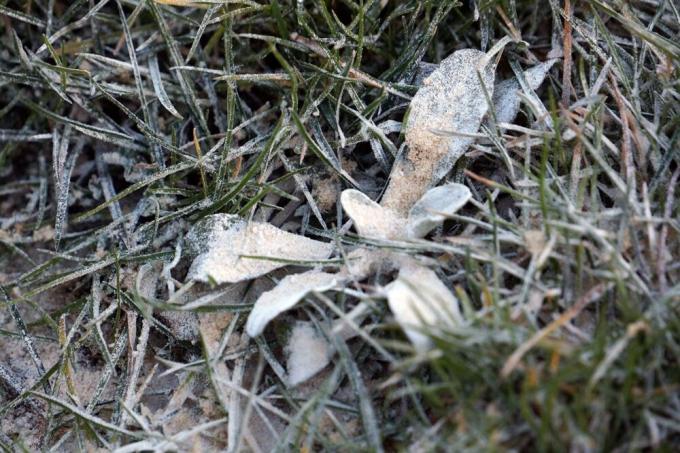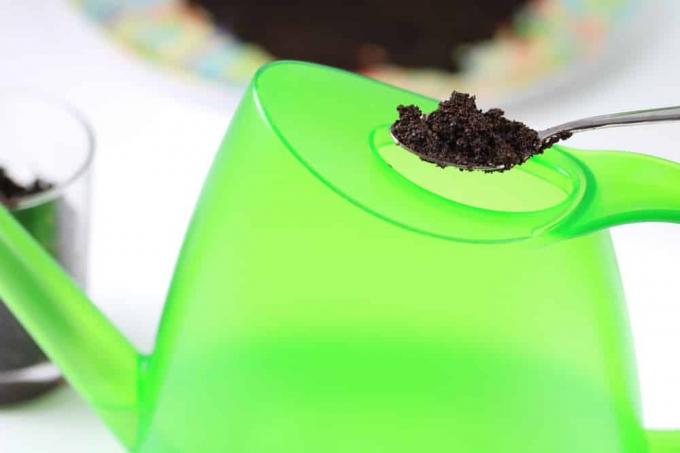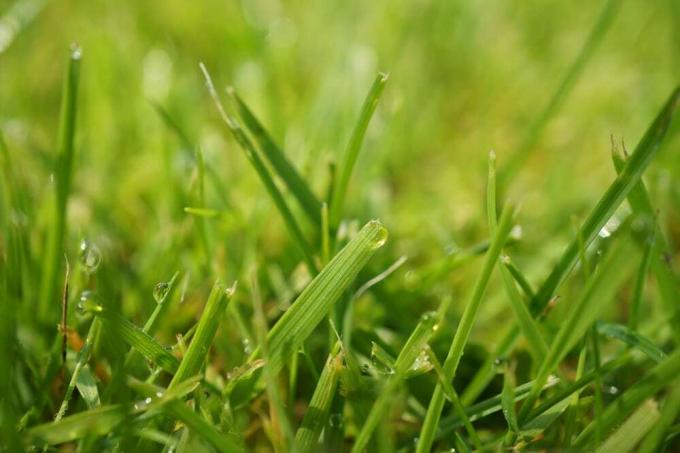

Table of contents
- Mineral fertilizer - definition
- Application of mineral fertilizer
- Organic fertilizer - definition
- Application of organic fertilizer
- The pros and cons
- Conclusion
In order to maintain a beautiful, well-groomed lawn, it must be fertilized regularly. This is particularly important for the reason that the individual blades of grass hold their own against invading weeds and this cannot get the upper hand on the lawn, because otherwise it will quickly become a natural one Meadow. Here, however, the question arises as to which fertilizer is the right one, should chemically produced mineral fertilizer or, better yet, organic fertilizer be used. Among other factors, the timing of fertilization is also decisive.
Mineral fertilizer - definition
Mineral fertilizer is mostly used for the cultivation and maintenance of lawns. This fertilizer is largely made up of potassium, phosphorus and nitrogen. Mineral fertilizers are actually by-products of mineral mining. These are processed through chemical processes for use as fertilizer. If the lawn shows signs of deficiency, it can be fertilized with mineral fertilizer. These can be recognized, for example, by a yellow lawn, or if there are more weeds on the lawn than blades of grass. Mineral fertilizers are commercially available as follows:
full-time fertilizer
- all nutrients are present in sufficient quantities
- Supplementary fertilizers are not necessary
- it is usually advisable to use such a full-time fertilizer
Fertilizer for specific nutrients
- these fertilizers are only ever specially manufactured
- it may be necessary to use several fertilizers
- there are different administration forms for all mineral fertilizers
as granules
- must first react with water to get into the soil
- Lawn can burn under certain circumstances
- Water the lawn immediately after fertilizing
as a liquid fertilizer
- is administered directly with the irrigation water
- Nutrients are already contained in liquid form
- get into the roots of the lawn faster
- liquid fertilizer is often more expensive than the granules
Tip:
If it has to be done quickly because the lawn is suffering from an acute lack of nutrients, then the mineral one is the one Liquid full-time fertilizer is definitely the best choice here to quickly regain balance. Because the mineral fertilizer helps quickly due to its composition, in the liquid state it is even faster.
Application of mineral fertilizer

Mineral fertilizers have been in use in one form or another for over 150 years. Above all, it is often used in productive cultivation, since the yield can be increased here through constant nutrient supply. However, it can also happen that weeds and unwanted plants are also encouraged to grow at the same time through the application of fertilizer. For this reason, the mineral fertilizers on the market today are enriched with additives intended to reduce weeds. However, if this fertilizer is used too often, the natural humus layer can be reduced. Over-fertilization of the lawn should therefore be avoided at all costs. Furthermore, the following measures should be observed during and after fertilizing the lawn:
- fertilizing three times with mineral fertilizer is ideal
- spring, summer and autumn
- different cycles require different nutrients
- Phosphorus promotes root growth
- Potassium provides strength against disease and eventual dehydration
- Nitrogen causes rapid new leaf formation and rapid growth
- if granules are used, do not sprinkle them on the blades of grass
- these could burn
Organic fertilizer - definition
Organic fertilizer used to be the only fertilizer used in agriculture. Then as now, it was still mixed and produced by the farmers themselves from plant and animal waste, liquid manure and manure. This can be compared to the compost known to hobby gardeners. Therefore, the self-made compost fertilizer is one of the organic fertilizers. Commercially produced organic fertilizers are also available. But these also retain their natural composition, no chemicals are used here. Horn shavings and horn meal also belong to the organic fertilizer, as well as guano, which has also proven itself as a long-term fertilizer. Organic fertilizers therefore mainly provide nitrogen and phosphorus.
Application of organic fertilizer
If a new lawn is laid out, it is advisable to enrich the soil with compost and horn shavings. In this way, all the necessary nutrients get into the soil, which receives additional required microorganisms, which are also in the compost and becomes rich in humus. In the later fertilizations, which take place when the lawn has already grown, fertilization is included Compost is no longer recommended because it can no longer be buried under the lawn can. Therefore, long-term lawn fertilizers should be obtained from the trade for pure lawn fertilization with organic fertilizers. These are available in liquid or granular form. In order to supply the lawn with all the nutrients, combined preparations are often necessary with organic fertilizers.
The pros and cons
Disadvantages of mineral fertilizers:
- Pollution of groundwater by nitrate
- Increase in nitrate in food
- Heavy metals accumulate in the soil
- the ground can become salty
- Humus decreases
- Microorganisms in the soil are reduced
- Groundwater is enriched with phosphate
- Production is very expensive
- Energy consumption during production is very high
- can cause damage to health
- keep away from children
- a fertilized pasture can only be used again after three to seven days
Disadvantages of organic fertilizers
- the effectiveness after fertilization only sets in later
- not all nutrients are delivered with a single fertilizer
- often different fertilizers have to be given at the same time
- organic fertilizers in the form of compost are not so good for a lawn
- cannot be lifted well on a dense lawn
- organic fertilizers do not provide the lawn with enough nutrients
- it must be over-fertilized with other fertilizers
- otherwise the lawn can grow moss
Benefits of mineral fertilizers
- rapid effectiveness after the measure
- a few days later the lawn is strengthened
- Nutrients are quickly dissolved in the soil
- from the lawn, these are quickly picked up again
- Deficiency symptoms can be counteracted quickly
Benefits of organic fertilizers
- there is a sustainable supply of nutrients to the soil
- the organic substances were decomposed by microorganisms
- organic fertilizer can be made by yourself
- improves soil structure
- the earth becomes more fertile
- more environmentally friendly, as there are no chemical additives
Tip:
As can be seen from the pros and cons of different fertilizers, both have pros and cons that should be weighed. A good combination of mineral and organic fertilizer would therefore be the ideal solution. Mineral fertilizers are applied in one season, while organic fertilizers can be used for the next season.

Conclusion
It is not easy to say which fertilizer is more suitable, as organic fertilizer is definitely more environmentally friendly, but mineral fertilizer provides the lawn with far more nutrients. Therefore, a combination of both fertilizers is recommended. For example, when preparing to lay out a new lawn, compost could be mixed in first. On the other hand, the mineral fertilizer is then used for the next fertilization. However, to ensure that there are no signs of deficiency of microorganisms and humus in the soil, it is also done again in between organic fertilizer used, which this time should come from the trade, so that the soil absorbs the nutrients faster can. Because putting pure compost on the well-grown lawn is not recommended.
 garden editorial
garden editorial I write about everything that interests me in my garden.
Learn more about fertilizer

Lawn lime: Lime against moss in the lawn
As soon as moss appears in the lawn, many a hobby gardener becomes restless - because soon the moss carpet can take over entire areas. With lawn lime, however, the unwelcome visitor can be skilfully put in his place.

Build your own Bokashi bucket | DIY instructions
Most of the kitchen waste goes on the compost or in the organic bin to add it back to nature's cycle. But there is a way to gain valuable fertilizer beforehand. We show how easy it is to build a Bokashi bucket and use it to obtain liquid fertilizer on the balcony or even in the apartment.

These 8 plants don't like coffee grounds as fertilizer
Hobby gardeners swear by the effect of the coffee grounds. It is fertilizer, snail protection, soil conditioner and cat deterrent all at the same time. In addition, it is free of charge and occurs daily in the household. Most plants are strengthened, but some are sensitive to the addition of coffee. We clarify.

Fertilize Christmas roses properly: 11 effective home remedies
Christmas roses are special flowers because, unlike almost all other perennials, they bloom in winter. They are insensitive and frost-hardy, and they can also multiply independently. Here you can find out what needs to be considered when fertilizing.

Lawn Bokashi: 6 steps to a cheap & natural fertilizer
The name Bokashi is still largely unknown. This method of using grass clippings comes from Japan. With a little preparation and a special form of processing, the clippings become valuable, nutrient-rich fertilizer that can be easily distributed in the garden.

Wood ash as fertilizer | These 70 plants love barbecue and charcoal
Home gardeners with a fireplace or tiled stove receive a natural fertilizer for free. Charcoal and charcoal leave behind a dusty residue that is packed with valuable nutrients. Read here under what conditions wood ash is suitable as a fertilizer. These 70 plants benefit from the unorthodox nutrient supply.
